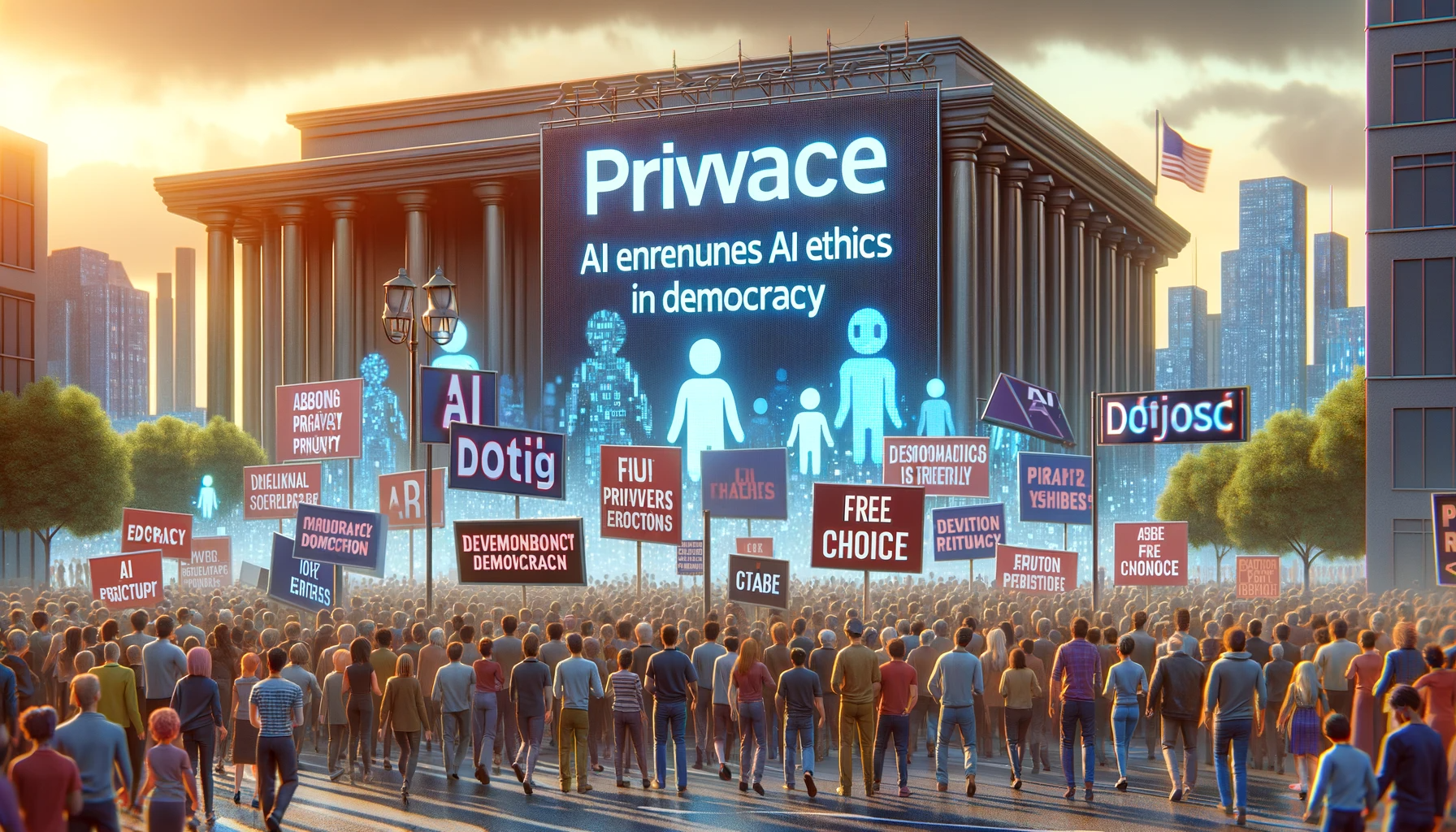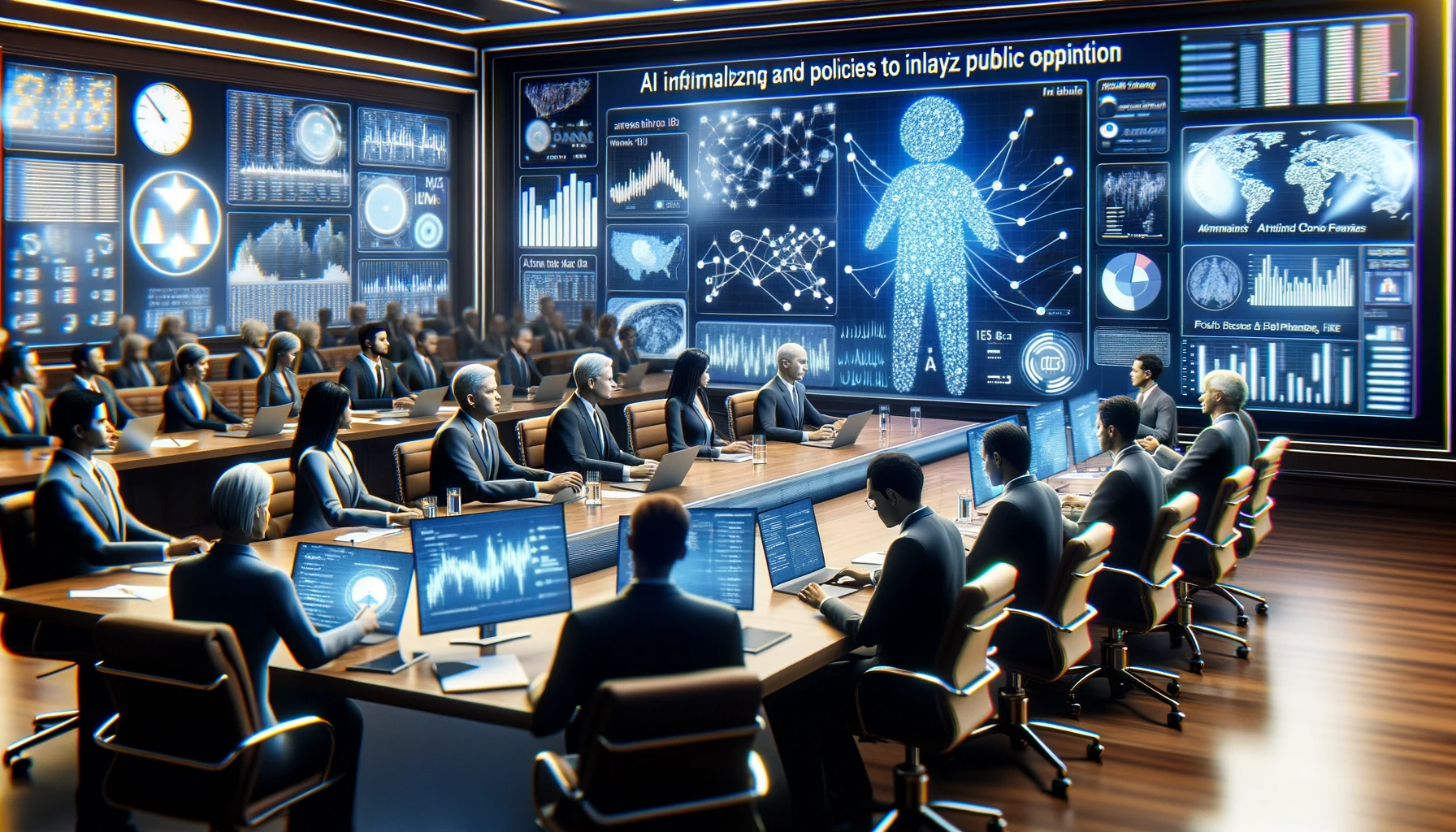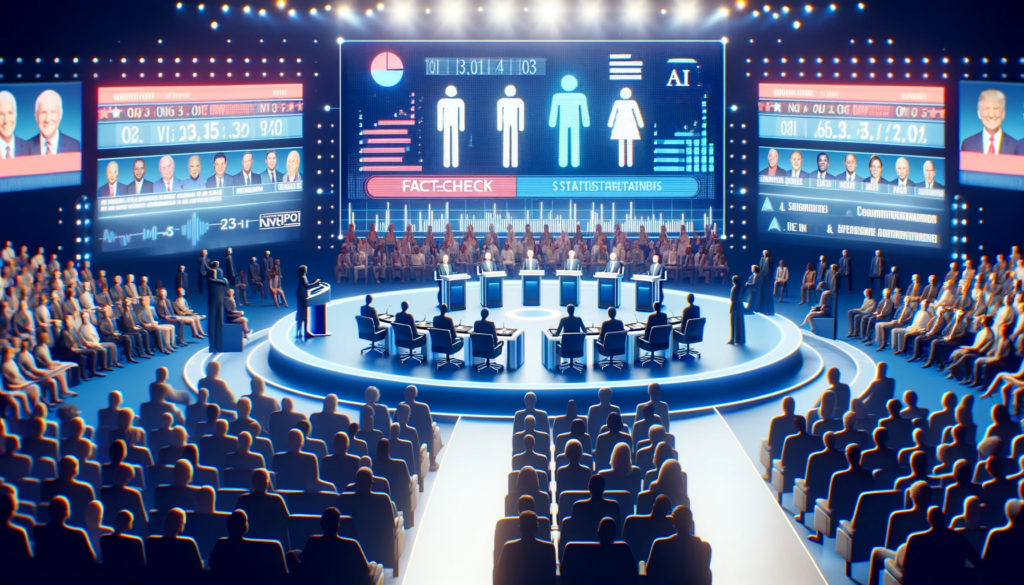Democracy, a cornerstone of modern society, represents the embodiment of people’s collective will, enabling them to participate in governance, make choices, and shape their destiny. It upholds values like freedom, equality, and justice, making it one of the most cherished systems of governance worldwide.
In recent years, the landscape of democracy has witnessed a profound transformation with the rapid integration of Artificial Intelligence (AI) into various facets of political processes. AI, characterized by its computational prowess and capacity to process vast amounts of data, has promised to revolutionize democratic practices. It offers the potential to enhance voter engagement, streamline policy-making, and even fortify election security.
However, this technological advancement also raises a critical question: Can AI contribute to strengthening democratic ideals, or does it harbor the potential to undermine the very principles it seeks to uphold? As AI becomes increasingly intertwined with political campaigns, voter outreach, and even policy formulation, it brings to the fore concerns about privacy, transparency, and the potential for manipulation.
This article embarks on a comprehensive exploration of the intricate relationship between AI and democracy. It delves into the ways AI is shaping political campaigns, influencing public opinion, and aiding in election security. It also scrutinizes the ethical and legal considerations surrounding AI in politics. Ultimately, this article seeks to dissect the multifaceted role of AI in democracy and to offer insights into whether it has the potential to strengthen or weaken the foundations of this cherished system.
AI in Political Campaigns
As technology continues to evolve, political campaigns have harnessed the power of AI to an unprecedented degree. AI plays a pivotal role in shaping campaign strategies, targeting potential voters, and optimizing messaging for maximum impact.
One of the key applications of AI in political campaigns is microtargeting. Campaigns use AI algorithms to analyze vast datasets, including social media activity, online behavior, and demographic information, to identify specific voter groups and their preferences. This allows campaigns to tailor their messages with laser-like precision, reaching potential supporters on issues that resonate with them. For example, an AI algorithm might identify a group of environmentally conscious voters and deliver campaign messages emphasizing a candidate’s commitment to environmental policies.
AI-driven chatbots and virtual assistants have also become commonplace in political campaigns. These chatbots engage with potential voters on social media platforms, answering questions, providing information, and even encouraging voter registration. They operate around the clock, ensuring that campaigns maintain a continuous presence in the digital realm.
While AI in political campaigns offers several advantages, it is not without concerns. The collection and analysis of vast amounts of personal data raise privacy issues. There are concerns about the potential for data misuse, especially when it comes to voter profiling. Additionally, the use of AI to generate personalized, emotionally charged content has led to debates about transparency and ethical campaigning.

AI in Voter Engagement
In recent years, AI has emerged as a valuable tool for increasing voter engagement and participation. It has the potential to address longstanding challenges in voter registration, mobilization, and education.
AI-powered voter registration tools have simplified and expedited the voter registration process. Chatbots and virtual assistants are deployed on various platforms to assist individuals in registering to vote. These AI-driven tools guide users through the registration process, ensuring they meet eligibility criteria and complete all necessary steps. This has been particularly beneficial in reaching young voters and historically underrepresented communities.
Moreover, AI is instrumental in voter mobilization efforts. Campaigns use AI algorithms to identify potential voters who are less likely to turn out on election day. They then deploy targeted messages and reminders to encourage these individuals to vote. This personalized approach has been effective in increasing voter turnout, especially in closely contested races.
Several AI initiatives have focused on voter education. Chatbots and AI-driven information platforms provide voters with easy access to unbiased information about candidates, issues, and voting procedures. These resources empower voters to make informed decisions.
AI’s role in voter engagement is not without challenges. Ensuring the accuracy of voter information and guarding against misinformation are ongoing concerns. Moreover, there are ethical considerations surrounding the use of AI to influence voter behavior, which require careful regulation and oversight.
AI and Disinformation
While AI holds promise in enhancing voter engagement and campaign strategies, it also presents a formidable challenge in the form of disinformation and fake news. AI algorithms are increasingly employed to spread false or misleading information, exacerbating political polarization and undermining the integrity of democratic processes.
AI-driven disinformation campaigns are sophisticated and insidious. These algorithms can generate and disseminate vast amounts of fake news articles, deepfake videos, and manipulated images. They target vulnerable individuals with content designed to stoke fears, amplify existing biases, and sow discord. For example, AI-generated social media posts might exploit divisive issues, such as immigration or healthcare, to provoke emotional responses and deepen political divides.
The consequences of AI-driven disinformation are far-reaching. They erode trust in institutions, delegitimize election outcomes, and hinder constructive political discourse. Addressing this challenge requires a multifaceted approach, involving technology companies, governments, and civil society.
AI’s role in disinformation is a pressing concern for democracy. It underscores the need for robust mechanisms to detect and counter false information, as well as ethical guidelines for the use of AI in disseminating political content. In the next sections, we will explore these issues further and consider the broader implications of AI for democracy.
AI in Election Security
Ensuring the security and integrity of elections is paramount for any democracy. AI has emerged as a valuable ally in this endeavor, offering advanced tools for detecting and preventing election interference.
One of the key applications of AI in election security is the detection of disinformation campaigns. AI algorithms can analyze vast amounts of social media data to identify suspicious patterns of behavior, such as coordinated misinformation campaigns or the spread of fake news. These algorithms can flag potentially harmful content for review by human moderators, allowing for a more rapid response to disinformation threats.
Additionally, AI-powered cybersecurity tools play a crucial role in safeguarding election infrastructure. These tools can detect and mitigate cyberattacks on voting systems, voter registration databases, and campaign websites. AI algorithms are adept at identifying unusual network behavior and patterns indicative of malicious activity.
Real-world examples of AI solutions used to safeguard elections include the deployment of AI-driven monitoring systems during elections. These systems continuously analyze online activity, looking for signs of disinformation campaigns or cyber threats. They provide election officials with real-time insights, enabling them to take proactive measures to protect the electoral process.

AI in Policy Making
AI’s influence extends beyond election campaigns and voter engagement; it also plays a role in policy decision-making processes. AI has the capacity to transform policymaking by providing data-driven insights and evidence-based analysis.
One of the primary contributions of AI to policy making is its ability to analyze vast datasets quickly. AI algorithms can process and interpret complex data, extracting valuable insights that inform policy decisions. For example, in healthcare policy, AI can analyze patient records, medical studies, and public health data to identify trends and recommend evidence-based policies.
AI-driven predictive modeling is another powerful tool in policy development. These models can simulate the potential outcomes of different policy choices, helping policymakers anticipate the impact of their decisions. For instance, in environmental policy, AI can model the effects of various regulations on carbon emissions and climate change.
Case studies illustrate the impact of AI on policy development. For instance, AI has been used to develop traffic management policies in smart cities. By analyzing real-time traffic data, AI algorithms can optimize traffic signals and reduce congestion, leading to more efficient transportation systems and reduced emissions.
Ethical and Legal Considerations
The growing role of AI in democracy raises ethical and legal considerations that demand careful attention. As AI becomes increasingly integrated into political processes, concerns about bias, discrimination, and accountability come to the forefront.
One of the primary ethical concerns is AI bias. AI algorithms can inadvertently perpetuate biases present in the data they are trained on. In the context of democracy, this can lead to biased voter targeting, unfair policy recommendations, or the amplification of existing social inequalities. Addressing AI bias requires transparency in AI development, diverse training data, and ongoing monitoring.
Discrimination in political processes is another issue of concern. AI algorithms used in campaigns or policy analysis must ensure that all individuals, regardless of their demographics, are treated fairly. Discriminatory outcomes, such as voter suppression or biased policy recommendations, can have profound implications for democracy.
Legal frameworks and regulations governing AI in politics are also essential. Ensuring transparency and accountability in the use of AI is a shared responsibility. Governments and international organizations must establish guidelines for AI use in political processes, ensuring that elections remain free and fair. These legal frameworks should address issues such as data privacy, disinformation, and campaign finance.
In the following sections, we will delve deeper into these ethical and legal considerations and examine the broader implications of AI for democracy.
AI’s Potential to Strengthen Democracy
While concerns about AI’s impact on democracy are valid, it’s essential to acknowledge its potential to strengthen democratic practices. AI has the capacity to enhance transparency, accountability, and citizen engagement in political processes.
One of AI’s strengths lies in its ability to process and analyze vast amounts of data quickly. This can be leveraged to improve transparency in government operations. AI-powered platforms can make government data more accessible and understandable to the public. For example, AI-driven data visualization tools can turn complex datasets into comprehensible graphics, enabling citizens to better understand government spending, policy decisions, and the allocation of resources.
AI can also contribute to greater accountability in democracy. AI algorithms can monitor government activities, flagging inconsistencies or potential ethical violations. For instance, AI-powered systems can detect corruption patterns by analyzing financial transactions and public records, thereby enabling authorities and citizens to hold accountable those who misuse public resources.
Success stories of AI positively impacting democracy include AI-driven citizen engagement platforms. These platforms utilize AI to facilitate direct interaction between citizens and policymakers. Citizens can voice their concerns, provide input on policy matters, and participate in public decision-making processes through these AI-driven interfaces. Such platforms promote a more participatory form of democracy.
AI’s Potential to Undermine Democracy
While AI offers potential benefits, there are valid concerns about its role in undermining democracy. AI’s capacity to concentrate power, manipulate public opinion, and perpetuate inequalities poses significant risks to democratic processes.
One of the primary concerns is the concentration of power. AI algorithms, when controlled by a small group or a powerful entity, can manipulate political discourse and decision-making. This concentration of influence can undermine the principle of equal representation and fairness in a democracy. For example, the use of AI-driven bots to amplify specific political messages can drown out diverse voices and create a skewed perception of public opinion.
AI’s ability to manipulate public opinion is another alarming issue. AI algorithms can target individuals with tailored political content, potentially leading to echo chambers and polarization. By analyzing user data and preferences, AI can reinforce pre-existing beliefs and create filter bubbles that limit exposure to diverse perspectives. This can erode the foundation of informed and open political debate in a democracy.
Case studies and examples of AI’s negative impact on democracy are prevalent. Instances of AI-driven disinformation campaigns, voter suppression tactics, and the use of deepfake technology to spread false information all highlight the risks posed by AI to the democratic process. These cases underscore the need for robust regulations and ethical guidelines to mitigate AI-related threats to democracy.
In the following sections, we will delve deeper into these arguments, examining specific instances and exploring potential solutions to address the challenges posed by AI in the context of democracy.
The Future of AI and Democracy
The future of AI’s role in democratic processes is both promising and challenging. As AI technology continues to advance, its impact on democracy will likely evolve in significant ways.
One potential advancement is the use of AI in enhancing citizen participation and decision-making. AI-driven platforms for public engagement and deliberation could become more sophisticated, allowing citizens to have a more direct and meaningful influence on policy decisions. These platforms could use AI to facilitate consensus-building and bridge political divides, promoting a more inclusive and participatory democracy.
AI may also play a pivotal role in improving election security. As AI algorithms for detecting election interference become more advanced, they could help safeguard the integrity of democratic elections. AI-driven cybersecurity measures can help protect voting systems from external threats, ensuring that citizens can exercise their right to vote without disruption.
However, the future of AI and democracy is not without its challenges. The potential for AI to further concentrate power in the hands of a few tech giants or political entities remains a concern. Striking the right balance between AI-driven efficiency and preserving democratic values will be an ongoing challenge.

In conclusion
In this article, we have explored the complex relationship between AI and democracy, considering both the potential benefits and risks. AI has the capacity to enhance transparency, accountability, and citizen engagement in democratic processes. It can also help address critical issues such as election security and data analysis for policymaking. However, there are valid concerns about AI’s potential to manipulate public opinion, concentrate power, and perpetuate inequalities.
As we move forward, it is crucial to recognize that AI is not inherently good or bad for democracy—it is how we use and regulate it that matters. Responsible AI development, ethical guidelines, and robust regulations are essential to harness AI’s potential while safeguarding democratic values.
The future of AI and democracy will be shaped by our collective choices and actions. It is our responsibility to ensure that AI contributes to a more inclusive, transparent, and participatory democracy, where the voices of all citizens are heard and respected. By addressing the challenges and embracing the opportunities, we can navigate the evolving landscape of AI and democracy with wisdom and responsibility.
